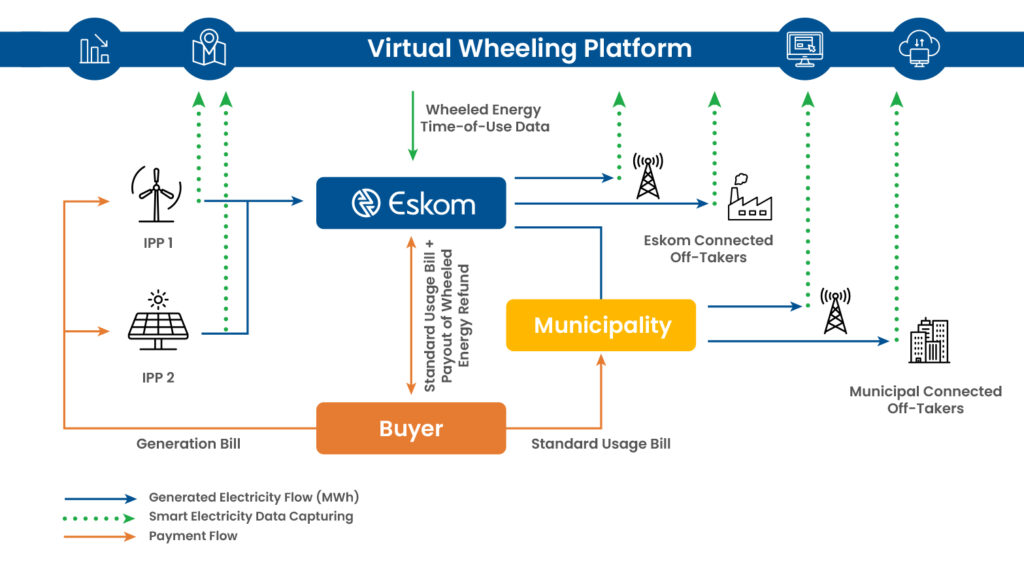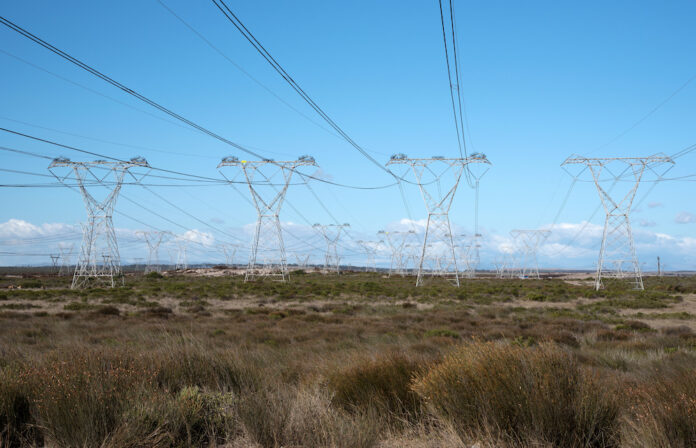Telco believes deal can overcome South Africa’s power grid load-shedding pain
Vodacom has signed a virtual wheeling deal with state-owned Eskom enabling the telco to secure Independent Power Producers (IPPs) under the same terms and conditions which underpin its agreement with the power company.
Under the deal the telco can access electricity from non-Eskom sources while still using Eskom’s transmission infrastructure and services. Vodacom is utilising a virtual energy wheeling platform developed by subsidiary Mezzanine and said several companies are showing commercial interest in the solution.
South Africa’s unstable grid has impacted every telco operating in the country causing them to ramp up capex on alternative power solutions including renewables. Eskom has been forced to impose periods of load-shedding on rotation since 2007 – last year there were more than 300 load-shedding events.
Vodacom South Africa spent more than ZAR4bn on backup power solutions and ZAR300m in the past financial year alone on operational costs such as diesel for generators.
Vodacom Group CEO Shameel Joosub said: “Vodacom’s partnership with Eskom is transformational in that our virtual wheeling solution will enable South Africa’s private sector to participate in resolving the energy crisis which continues to impact the country’s economy.”
He added: “It also provides a blueprint for other South African corporates to adopt, as we pool our collective resources with the common objective of bringing an end to load shedding. The virtual wheeling solution has the potential to be fast-tracked, depending on the available licensed capacity of IPPs.”
Generating at site is not always possible
Traditional wheeling – the transfer and balancing of privately generated energy from the point of generation – is a common practice globally and involves a one-to-one relationship between an IPP and a buyer using the national grid to convey their energy. However, its application is limited for companies with complex operating environments.
For example, Vodacom South Africa’s operating situation is unique due to the complexities associated with having more than 15,000 distributed low-voltage sites across the country that are linked to 168 municipalities. Up until this point, this complexity has prevented Vodacom from accessing large scale renewable energy from IPPs. The virtual wheeling solution addresses these challenges.
“Converting our existing fossil-fuel based electricity supplies directly with on-site renewables is limited by technical constraints that are difficult to scale. We explored a traditional wheeling option, but this had numerous limitations, which we believed could be overcome by reimagining the problem and using technology to solve the issue,” he said.
“Vodacom had four objectives when we approached Eskom with this solution: one to remove complexity, two to use technology to solve legacy limitations, three to access renewable energy with a sound business case and lastly, encouraging private participation to help solve the energy crisis,” he added.

After a successful pilot phase, which concluded last year, and following rigorous testing, the newly co-developed solution is now accessible to the public and private sector on a larger scale. With the agreement now signed, Vodacom will be able to add more capacity to the grid without impacting Eskom’s balance sheet while helping to reduce its own greenhouse gas emissions.
“We estimate that this initial phase will move approximately 30% of Vodacom SA’s power demand onto renewable sources, a significant step towards our 2025 renewable energy ambitions. To make up the difference, we are working hard at exploring and developing additional solutions,” said Vodacom CEO Sitho Mdlalose.
“Most importantly, it also has the added benefit of positively impacting the supply deficit currently being experienced and nurturing the growth of renewable energy production in South Africa.”
Battery theft and site vandalism
Vodacom also announced enhanced security measures to overcome base station vandalism and battery theft in KwaZulu-Natal. Every month, the region experiences 90 to 140 incidents of vandalism and between 120 and 160 incidents of battery theft at sites.
To maintain connectivity for customers during load-shedding, Vodacom KwaZulu-Natal region has implemented backup power solutions at base station sites. However, this has led to criminals shifting their focus to stealing generators, load cables, diesel and backup batteries and vandalising generator vaults and battery cabinets.
Western Cape investment
Earlier this week the telco announced it will be investing ZAR570m in the Western Cape region this financial year. Of this investment, ZAR470m will go towards its broadband network infrastructure in urban and rural areas including expanding its 5G footprint and LTE capacity. The remaining ZAR100m will go on energy projects for uninterrupted connectivity during power outages, particularly for longer spells which can sometimes finish batteries off.
Vodacom rebrands towerco as Mast
In separate news, Vodacom has rebranded its tower assets company to Mast according to Daily Investor. The telco first announced establishing a separate legal entity for its South African tower assets, wholly owned by Vodacom Group, in 2022.
Vodacom appointed former Helios Towers and American Tower executive Michael Magambo as the managing director of Mast. The Companies and Intellectual Property Commission (CIPC) database reportedly shows that Mast Services (Pty) Ltd was registered on 25 July 2022 — days after Vodacom first announced TowerCo.
Mast’s directors, as per the CIPC, are Andrew Barendse, Roy van Vuuren, Michael Magambo, Sitholizwe Mdlalose, and Refilwe Nkabinde. Neo Masiku is the company secretary.



